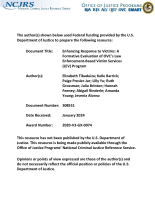International Association of Chiefs of Police (IACP)
Responding to Intimate Partner Violence Related Strangulation Integrating Policy, Practice, and Rese
This webinar examines the problem of Intimate Partner Violence Strangulation and an innovative response policy. The presentation will include an overview of the nature and extent of strangulation, its dangers, and adverse medical consequences followed by a review of a Strangulation Ordinance in Burleson, Texas that mandates extensive training for first responders and a city-wide response protocol for strangulation detection and investigation, documentation of strangulation signs and symptoms, medical assistance, and service referrals for strangulation survivors.
See the YouTube Terms of Service and Google Privacy Policy
Celebrating 10 Years of NIJ’s Law Enforcement Advancing Data and Science (LEADS) Scholars Program - 2024 NIJ Research Conference
In 2014, NIJ established the Law Enforcement Advancing Data and Science (LEADS) Scholars Program to support research-minded, mid-career sworn law enforcement officers working to integrate research into agency policy and practice. The LEADS Scholars Program helps participants develop independent research and provides support to identify current evidence on priority issues.
See the YouTube Terms of Service and Google Privacy Policy
Enhancing Response to Victims: A Formative Evaluation of OVC's Law Enforcement-Based Victim Services (LEV) Program
Present but not Prevalent: Identifying the Organizational Correlates of Researcher-Practitioner Partnerships in U.S. Law Enforcement
Examining Intersections between Law Enforcement and Victims
Criminal Justice Testing and Evaluation Consortium
Electro-Muscular Disruption Technology: A Nine-Step Strategy for Successful Deployment
Resource Sampler: Officer Traffic Safety
Multilevel Evaluation of Project Safe Neighborhoods
Project Safe Neighborhoods (PSN) is a DOJ-sponsored initiative to reduce violent crime, particularly gun crime, by fostering cooperation by criminal justice agencies and local partners to develop and implement strategic approaches.
See the YouTube Terms of Service and Google Privacy Policy
Program for Improving Relations and Promoting Healing Between Communities and Police Not Yet Ready for Outcome Evaluation
Collaboration Enhances Trauma-Informed Response to Sexual Assault Survivors]



